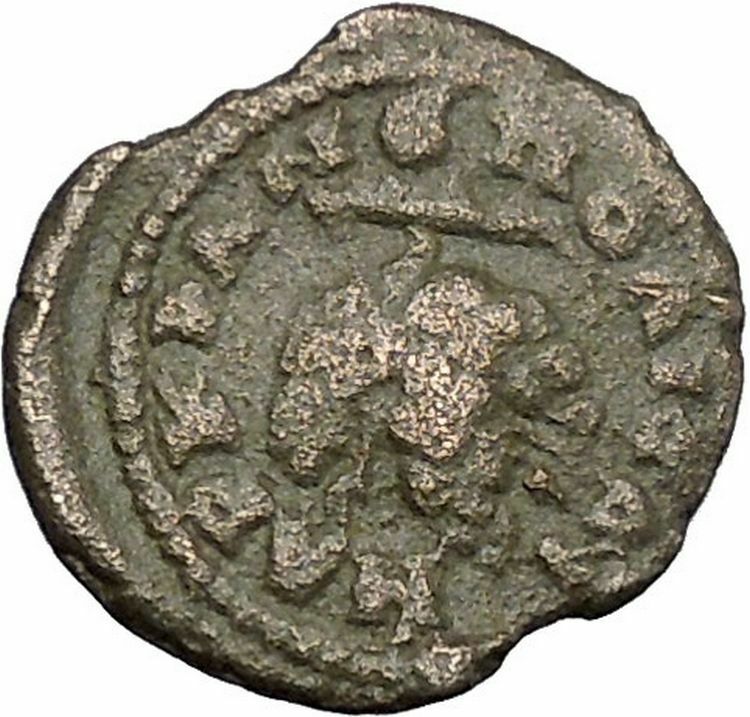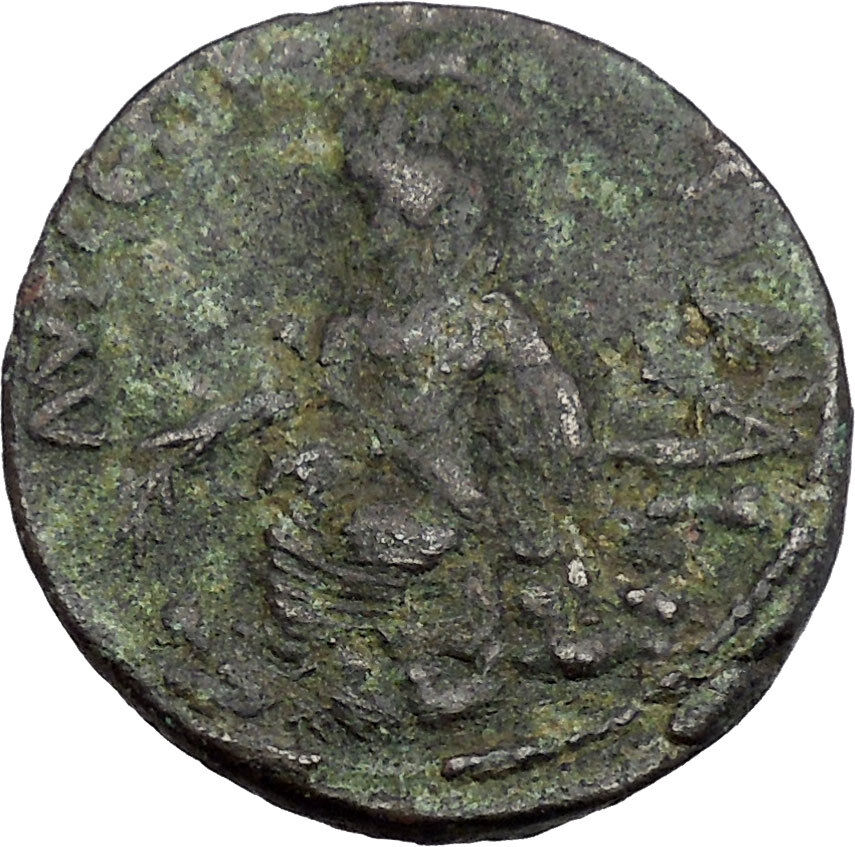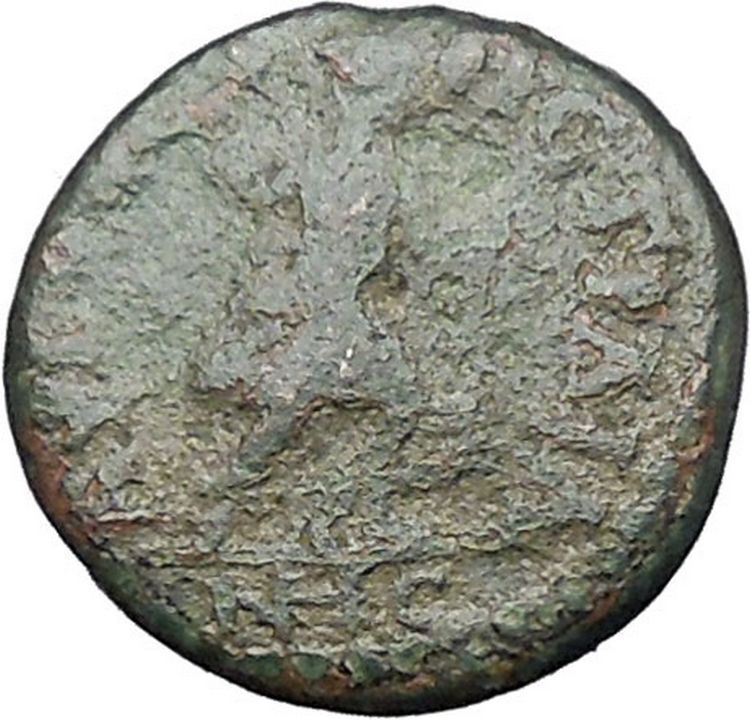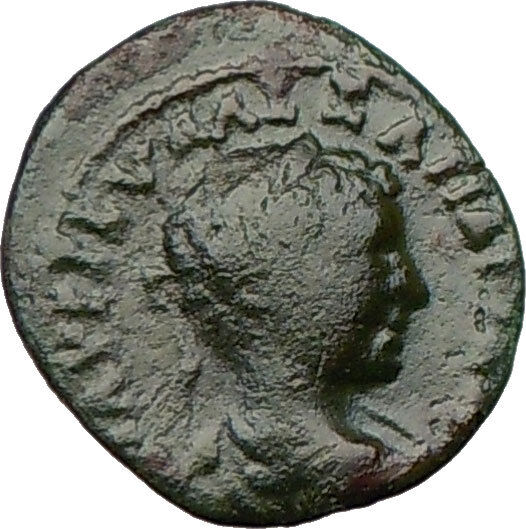|
Faustina II
–
Roman Empress
& Wife of
Emperor
Marcus Aurelius
–
161-175 A.D. –
Bronze 22mm (6.16 grams) of
Pautalia
in
Thrace
Reference: Moushmov 4114
ΦAVCTEINA CEBACTH, draped bust right
OVΛΠIAC ΠAVTAΛIAC, Tyche standing left, turreted, with
rudder & cornucopia.
You
are bidding on the exact item pictured, provided with a
Certificate of Authenticity and Lifetime Guarantee of
Authenticity.
Kyustendil (Bulgarian:
Кюстендил, historically
Велбъжд, Velbazhd) is a town in the
far west of Bulgaria
, the capital of
Kyustendil Province
, with a population of 58,059 (2005 census). Kyustendil
is situated in the southern part of the Kyustendil Valley, 90 km southwest of
Sofia
. It was
named after the medieval lord of the surrounding region,
Constantine Dragaš
.
A Thracian
settlement was founded at the place of the modern town in the
5th
-4th
century BC and the
Romans
developed it into an important stronghold, balneological resort and trade
junction called Pautalia in the 1st century AD.
The Hisarlaka fortress was built in the 4th century and the town was
mentioned under the
Slavic
name of Velbazhd (Велбъжд, meaning “camel”)
in a 1019 charter by the
Byzantine
Emperor
Basil II
.
It became a major religious and administrative centre.
Tyche (Greek for luck; the Roman equivalent was
Fortuna
) was the
presiding
tutelary deity
that
governed the fortune and prosperity of a city, its
destiny. Increasingly during the Hellenistic period,
cities had their own specific iconic version of Tyche,
wearing a
mural crown
(a crown
like the walls of the city).

The
Greek historian
Polybius
believed that
when no cause can be discovered to events such as
floods, droughts, frosts or even in politics, then the
cause of these events may be fairly attributed to Tyche.
Stylianos Spyridakis concisely expressed Tyche’s
appeal in a Hellenistic world of arbitrary violence and
unmeaning reverses: “In the turbulent years of the
Epigoni of Alexander
,
an awareness of the instability of human affairs led
people to believe that Tyche, the blind mistress of
Fortune, governed mankind with an inconstancy which
explained the vicissitudes of the time.”
In literature, she might be given various
genealogies, as a daughter of
Hermes
and
Aphrodite
, or
considered as one of the
Oceanids
, daughters of
Oceanus
and
Tethys
, or of
Zeus
. She was connected
with
Nemesis
and
Agathos Daimon
(“good
spirit”).
She was uniquely venerated at
Itanos
in Crete, as
Tyche Protogeneia, linked with the Athenian
Protogeneia
(“firstborn”), daughter of
Erechtheus
, whose
self-sacrifice saved the city.
She had temples at
Caesarea Maritima
,
Antioch
,
Alexandria
and
Constantinople
. In
Alexandria
the
Tychaeon, the temple of Tyche, was described by
Libanius
as one of the
most magnificent of the entire Hellenistic world.
Tyche appears on many
coins
of the
Hellenistic period in the three centuries before the
Christian era, especially from cities in the Aegean.
Unpredictable turns of fortune drive the complicated
plotlines of
Hellenistic romances
,
such as
Leucippe and Clitophon
or
Daphnis and Chloe
.
She experienced a resurgence in another era of uneasy
change, the final days of publicly sanctioned
Paganism
, between the
late-fourth-century emperors
Julian
and
Theodosius I
who
definitively closed the temples. The effectiveness of
her capricious power even achieved respectability in
philosophical circles during that generation, though
among poets it was a commonplace to revile her for a
fickle harlot.
In
medieval art
, she was
depicted as carrying a
cornucopia
, an
emblematic
ship’s
rudder, and the
wheel of fortune
, or
she may stand on the wheel, presiding over the entire
circle of fate.
The constellation of
Virgo
is sometimes
identified as the heavenly figure of Tyche, as well as
other goddesses such as
Demeter
and
Astraea
.
Annia
Galeria Faustina Minor (Minor Latin for
the younger), Faustina Minor or Faustina
the Younger

(February
16 between 125 and 130-175) was a daughter of
Roman Emperor
Antoninus Pius
and Roman Empress
Faustina the Elder
. She was a Roman Empress and wife
to her maternal cousin Roman Emperor
Marcus Aurelius
. Though Roman sources give a
generally negative view of her character, she was held
in high esteem by soldiers and her own husband and was
given divine honours after her death.
//
Biography
Faustina, named after her mother, was
her parents’ fourth and youngest child and their second
daughter; she was also their only child to survive to
adulthood. She was born and raised in
Rome
.
Her great uncle, the Emperor
Hadrian
, had arranged with her father for Faustina
to marry
Lucius Verus
. On February 25, 138, she and Verus
were betrothed.
Verus’ father
was Hadrian’s first adopted son and
his intended heir. However when Verus’ father died,
Hadrian chose Faustina’s father to be his second adopted
son, and eventually, he became Hadrian’s successor.
Faustina’s father ended the engagement between his
daughter and Verus and arranged for Faustina’s betrothal
to her maternal cousin,
Marcus Aurelius
; Aurelius was also adopted by her
father. On May 13, 145, Faustina and Marcus Aurelius
were married. When her father died on March 7, 161, her
husband and Lucius Verus succeeded to her father’s
throne and became co-rulers. Faustina was given the
title of
Augusta
and became Empress.
Unfortunately, not much has survived
from the Roman sources regarding Faustina’s life, but
what is available does not give a good report.
Cassius Dio
and the
Augustan History
accuse Faustina of ordering
deaths by poison and execution; she has also been
accused of instigating the revolt of
Avidius Cassius
against her husband. The Augustan
History mentions adultery with sailors, gladiators,
and men of rank. However, Faustina and Aurelius seem to
have been very close and mutually devoted. Her husband
trusted her and defended her vigorously against
detractors.
Faustina accompanied her husband on
various military campaigns and enjoyed the love and
reverence of Roman soldiers. Aurelius gave her the title
of Mater Castrorum or Mother of the Camp.
Between 170-174, she was in the north, and in 175, she
accompanied Aurelius to the east. However, these
experiences took their toll on Faustina, who died in the
winter of 175, after an accident, at the military camp
in Halala (a city in the
Taurus Mountains
in
Cappadocia
).
Aurelius grieved much for his wife
and buried her in the Mausoleum of Hadrian in Rome. She
was deified: her statue was placed in the Temple of
Venus in Rome and a temple was dedicated to her in her
honor. Halala’s name was changed to Faustinopolis
and Aurelius opened charity schools for orphan girls
called Puellae Faustinianae or ‘Girls of
Faustina’.[1]
The Baths of Faustina in
Miletus
are named after her.
In their thirty years of marriage,
Faustina bore Marcus Aurelius thirteen children:
-
Annia Aurelia Galeria Faustina
(147-after 165)
-
Gemellus Lucillae (died around
150), twin brother of Lucilla
-
Annia Aurelia Galeria
Lucilla
(148/50-182), twin sister of Gemellus,
married her father’s co-ruler
Lucius Verus
-
Titus Aelius Antoninus (born
after 150, died before 7 March 161)
-
Titus Aelius Aurelius (born after
150, died before 7 March 161)
-
Hadrianus (152-157)
-
Domitia Faustina (born after 150,
died before 7 March 161)
-
Fadilla
(159-after 211)
-
Annia Cornificia Faustina Minor
(160-after 211)
-
Titus Aurelius Fulvus Antoninus
(161-165), twin brother of Commodus
-
Commodus
(161-192), twin brother of Titus
Aurelius Fulvus Antoninus, later emperor
-
Marcus Annius Verus Caesar
(162-169)
- Vibia Aurelia Sabina (170-died before 217)
|










